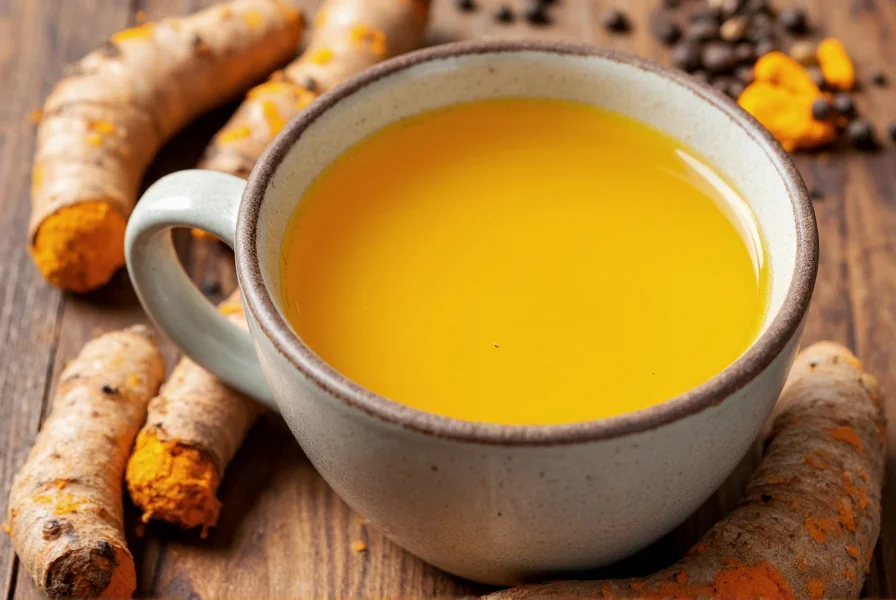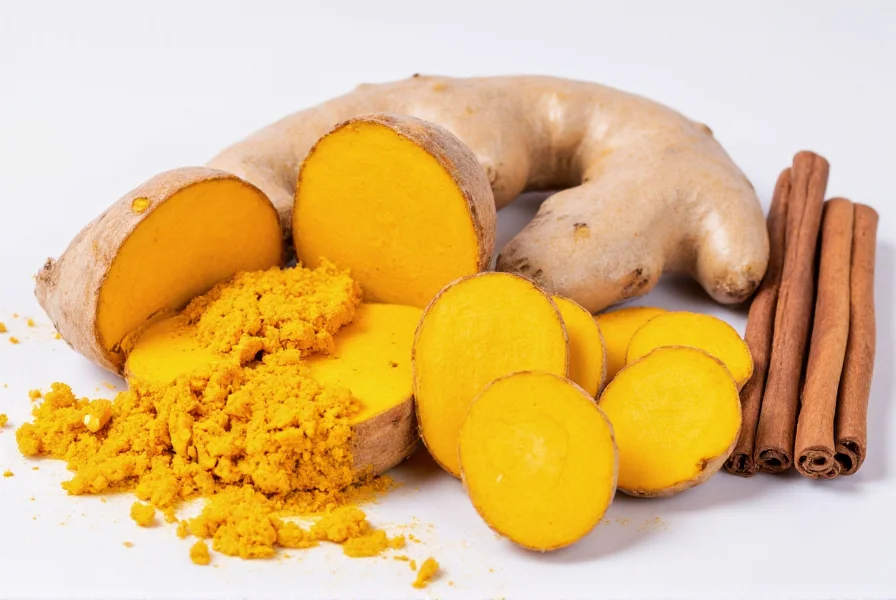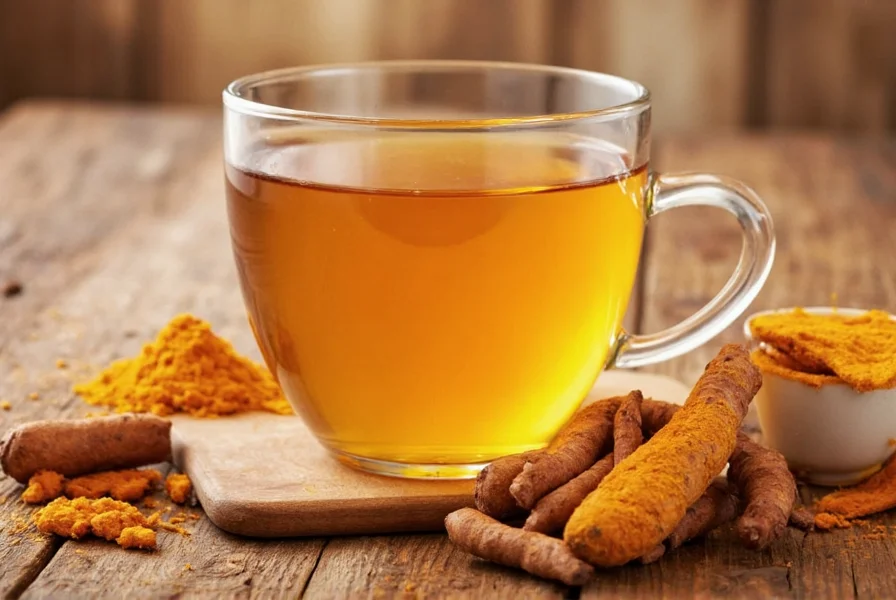Curcumin, the golden compound in turmeric, has captured scientific attention for its impressive health properties. When brewed as tea, this ancient spice delivers a soothing beverage with potential therapeutic benefits backed by growing research. Understanding what turmeric tea is good for requires examining both traditional uses and modern scientific validation.
The Science Behind Turmeric Tea Benefits
Turmeric tea's health advantages primarily stem from curcumin, which constitutes about 2-8% of turmeric root. This polyphenol demonstrates powerful biological activities, though its low bioavailability presents challenges. When prepared properly—as turmeric tea with black pepper (piperine) and a fat source like coconut oil—absorption increases significantly.

Key Health Benefits of Turmeric Tea
Research indicates turmeric tea may provide several specific health advantages when consumed regularly as part of a balanced diet.
1. Powerful Anti-Inflammatory Effects
Chronic inflammation contributes to numerous health conditions. Curcumin in turmeric tea inhibits multiple molecules involved in inflammation pathways. A 2017 review in Foods noted that curcumin's anti-inflammatory effects compare favorably with some anti-inflammatory drugs, without the side effects. Drinking turmeric tea daily may help manage low-grade inflammation associated with modern lifestyles.
2. Antioxidant Protection Against Cellular Damage
Curcumin neutralizes free radicals while boosting the body's own antioxidant enzymes. This dual action helps protect cells from oxidative stress, which contributes to aging and various diseases. The Journal of Medicinal Food published research showing curcumin's antioxidant capacity exceeds that of vitamins C and E in certain laboratory tests.
3. Joint Health and Arthritis Management
Several clinical trials suggest turmeric tea benefits for joint health. A study in the Journal of Alternative and Complementary Medicine found curcumin supplementation provided relief comparable to ibuprofen for osteoarthritis patients. The anti-inflammatory properties help reduce joint pain and improve mobility when consumed consistently.
| Benefit | Scientific Support Level | Recommended Consumption |
|---|---|---|
| Anti-inflammatory effects | Strong (human studies) | 1-2 cups daily |
| Antioxidant protection | Strong (lab and animal studies) | 1 cup daily |
| Joint pain relief | Moderate (human clinical trials) | 2 cups daily for chronic issues |
| Digestive support | Preliminary (traditional use) | After meals as needed |
4. Digestive System Support
Turmeric tea has been used traditionally to support digestion. Modern research suggests curcumin may stimulate bile production, aiding fat digestion. A 2013 study in Digestive Diseases and Sciences indicated turmeric could help reduce symptoms of indigestion and bloating. Drinking turmeric tea after meals may promote comfortable digestion for many people.
5. Cardiovascular Health Considerations
Emerging research suggests turmeric tea benefits for heart health. Curcumin appears to improve endothelial function—the lining of blood vessels—which plays a crucial role in blood pressure regulation. A 2017 review in Advances in Nutrition highlighted curcumin's potential role in reducing heart disease risk factors, though more human studies are needed.
6. Cognitive Function and Brain Health
Preliminary research indicates curcumin may cross the blood-brain barrier and provide neuroprotective effects. Studies suggest it might increase brain-derived neurotrophic factor (BDNF), a growth hormone that functions in the brain. While research on turmeric tea specifically for brain health remains limited, the anti-inflammatory and antioxidant properties likely contribute to overall cognitive support.

Preparing Turmeric Tea for Maximum Benefits
To maximize what turmeric tea is good for, preparation matters. Simply steeping turmeric powder in hot water delivers limited benefits due to curcumin's poor bioavailability. For optimal results:
- Add 1/4 teaspoon black pepper to enhance absorption by up to 2000%
- Include a healthy fat like coconut oil or almond milk
- Use fresh turmeric root when possible (grated)
- Simmer for 10-15 minutes rather than just steeping
- Consider adding complementary ingredients like ginger or cinnamon
Safety Considerations and Potential Side Effects
Turmeric tea is generally safe for most people when consumed in culinary amounts. However, certain considerations apply:
- May interact with blood thinners—consult your doctor if taking anticoagulants
- High doses might cause digestive upset in sensitive individuals
- Pregnant women should consult healthcare providers before regular consumption
- Those with gallbladder issues should exercise caution
The typical dietary amount of turmeric (about 1-3 grams daily) is considered safe, but therapeutic doses used in studies often exceed what's achievable through tea alone. Turmeric tea benefits are best realized as part of an overall healthy lifestyle rather than as a standalone treatment.
Limitations of Current Research
While promising, research on turmeric tea benefits has limitations. Many studies use concentrated curcumin supplements rather than tea preparations. Human trials are often small or short-term. The bioavailability challenge means the curcumin content in a typical cup of turmeric tea may be lower than doses used in clinical studies. More research specifically on turmeric tea consumption patterns would strengthen our understanding of its health impacts.
Conclusion: What Turmeric Tea Is Good For
Based on current evidence, turmeric tea offers several potential health advantages, particularly for inflammation reduction, antioxidant protection, and joint health support. While not a cure-all, incorporating properly prepared turmeric tea into your routine may contribute to overall wellness. The key benefits of turmeric tea make it a valuable addition to a health-conscious lifestyle when consumed consistently and prepared to maximize curcumin absorption. As research continues to evolve, our understanding of what turmeric tea is good for will become increasingly refined.











 浙公网安备
33010002000092号
浙公网安备
33010002000092号 浙B2-20120091-4
浙B2-20120091-4